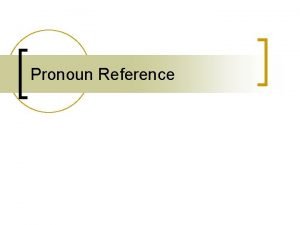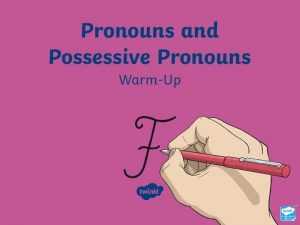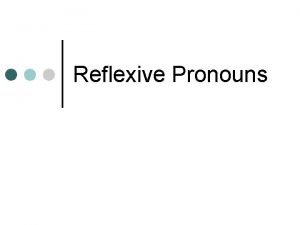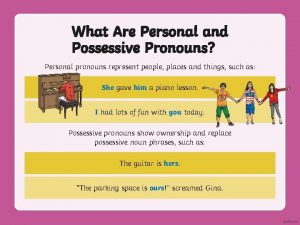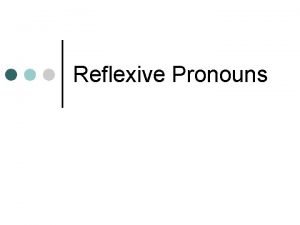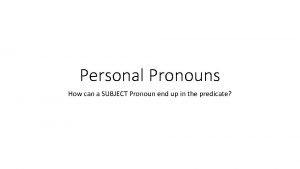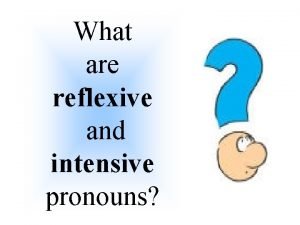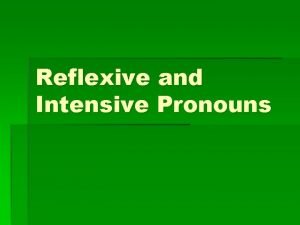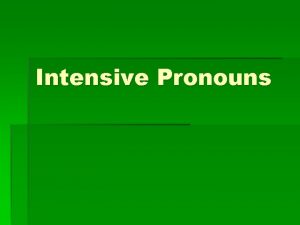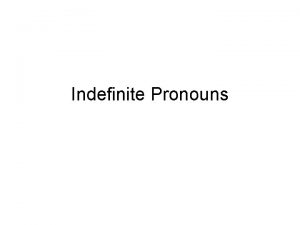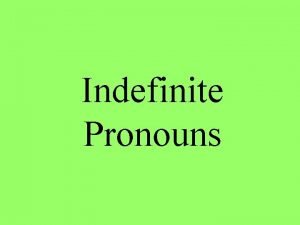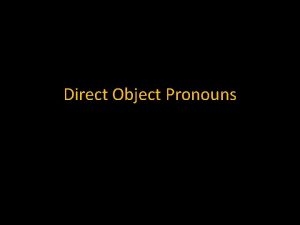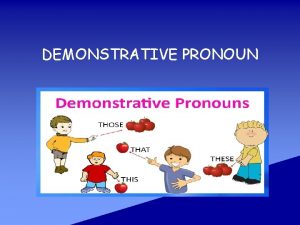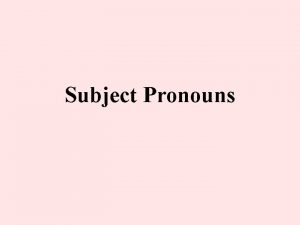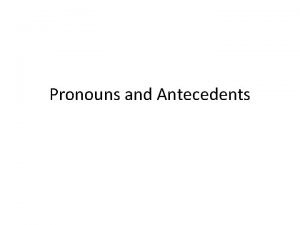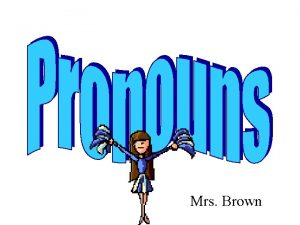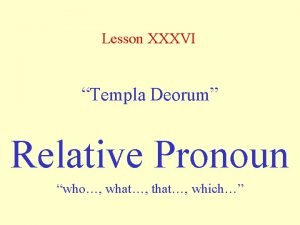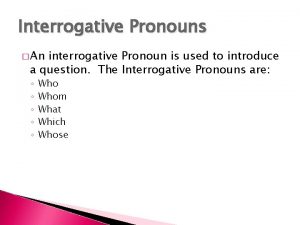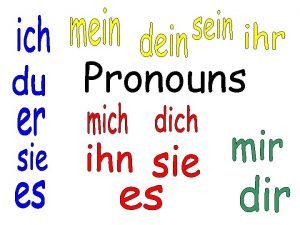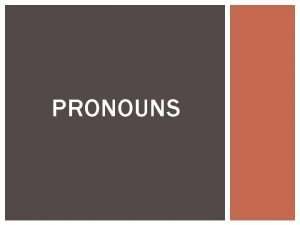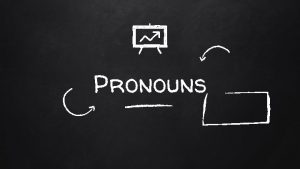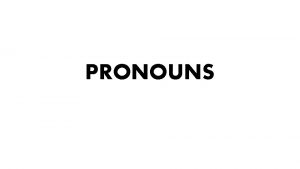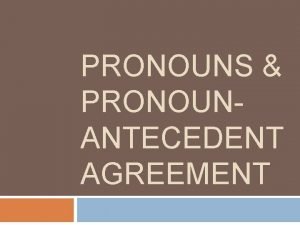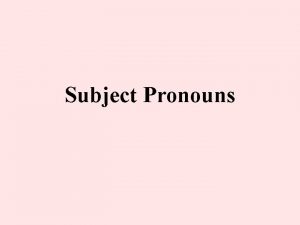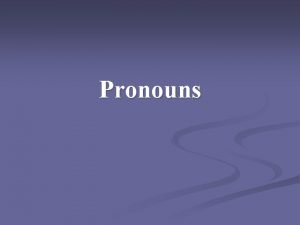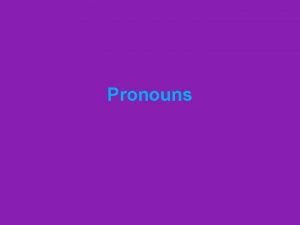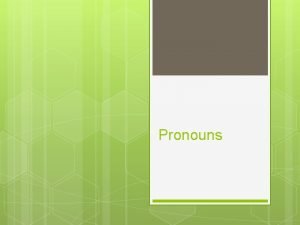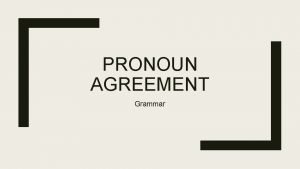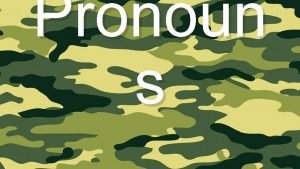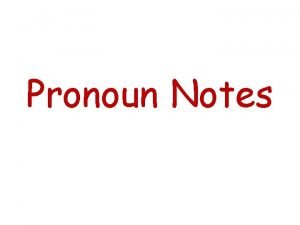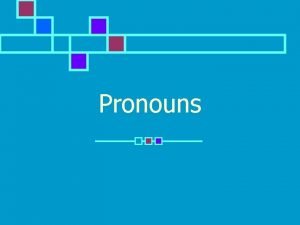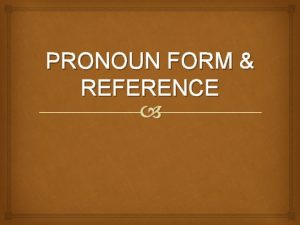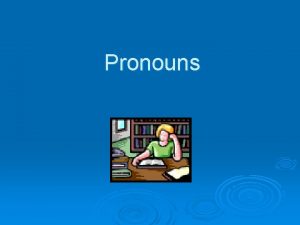PRONOUNS Whats a Pronoun A pronoun is a






























- Slides: 30

PRONOUNS

What’s a Pronoun? • A pronoun is a word that takes the place of a noun or other pronoun – It can take the place of a subject word • (I, you, he, she, it, we, they) – It can take the place of an object word • (me, you him, her it, us, them) – It can take the place of a possessive word • (my, mine, yours, his, hers, its, ours, theirs)

What’s an antecedent? • The word that the pronoun replaces. – Hermione Granger threw her wand onto the floor • (“her” renames “Hermione Granger”). – When Ron Weasley saw the wand drop, he picked it up and handed it to her. • (“it” renames the “wand”) – Then Ron and Hermione went to their Defense Against the Dark Arts class. • (“their” renames “Ron and Hermione”)

AGREEMENT

Agree in Person – I hate to proofread my paper because proofreading is such a boring thing for you to do. • (disagreement in person--first person antecedent “I”, second person pronoun “you”) – "Why should I study literature? You don't get anything out of it" • (disagreement in number—I shouldn’t study it because “you” don’t get anything out of it?

Agree in Number • Singular antecedents get singular pronouns – The boy tossed his hat on the table. • Plural antecedents get plural pronouns – The boys tossed their hats on the table.

General Pronoun-Antecedent Agreement Rules • Compound antecedents are usually plural; – Joey and Melissa think their kids are brilliant. • If two antecedents are joined by either/or, neither/nor, the pronoun agrees with the antecedent closest to it; – Either Michael or his friends will bring their video games to the party. – Either his friends or Michael will bring his video games to the party. (This sentence is correct, but sounds illogical. Word the sentence like the first example rather than the second). • The pronoun agrees with the antecedent, not the object of the prepositional phrase; – Each of the dogs needs its own crate.

General Pronoun-Antecedent Agreement Rules • • Collective noun can be either singular or plural, depending on the context. – The jury took only two hours to reach its verdict. (Emphasizes the singularity of the jury) – The jury took only two hours to reach their verdict. (Emphasizes the jury as a group of individuals) Avoid sexism – Not “A doctor should listen carefully to his patients. ” – But rather (1) making the pronoun and its antecedent plural, or (2) reword the sentence. • Doctors should listen carefully to their patients. • Doctors should listen carefully to patients.

Vague Pronoun Reference • "Mom wasn't sure if Jane had her make-up, " – it is unclear if "her" refers to Mom or Jane. Whose make up is it? • “Mom wasn’t sure if Jane had brought Mom’s make up. ” • “Mom wasn’t sure if Jane had brought Jane’s make up. ” OR • "Had Jane brought her make up? " Mom wondered. • Mom thought, "Has Jane brought my make up? "

Example: The group has__ meeting here. 1. Anyone can get __ name in the news. its 2. None of the checks were cashed; ___ finally expired. 3. The chef cut ___ on the thumb while peeling carrots. 4. A person should insure ____ valuables. 5. The family has ___ eye on a new house. 6. The code breakers shared ___ secrets. 7. Everybody has ___ own dreams and goals. 8. One can be happy only if ___ has respect for ___. 9. The senior class wore ___ rings proudly. 10. Children never realize how loud ___ can be.

11. My mother and her sister took ___ vacation together. 12. Either Mike or John wears a patch over ___ eye. 13. All are welcome: ___ just need to call for directions to the party. 14. Neither documentaries nor the news is given enough money by ___ network. 15. San Diego and San Jose get ___ names from Spanish. 16. Either Eleanor Roosevelt or Ellen Wilson is believed to have covered for ___ husband during presidential emergencies. 17. Cars cost more than ___ owners expect them to. 18. Venus and Mars have ___ orbits nearer to Earth than to any other planets. 19. The band starts ___ tour tomorrow night. 20. Any of the candidates could win; ___ are very much alike.

Personal Pronoun Takes the place of a specific or I, you, he, she, etc. . named person or thing. Personal Subject Pronouns For example: • He listens to music every day. • Are you the delegates from Rwanda? • After many years, they returned to their homeland. Personal Object Pronouns For example: • Tom kidnapped Rita and forced her to live with him. • Deborah and Roberta will meet us at the newest café in the market.

• Exercise: Name the personal pronouns in the following sentences 1. 2. 3. 4. 5. 6. 7. 8. 9. 10. 11. 12. 13. 14. 15. You and I can attend the lecture. Neither he nor you can be present. You and your brother should have been there. They have come to see the park. Henry and I will come to see you. It will rain tomorrow. She had promised to bring the book. Thou shalt not steal. I love cookies! John gave us a call. We won the game. Our family went to the beach. The green car is ours. He called the doctor. The teacher gave him a test. She has a bad cold.

Select the correct pronoun for each sentence. Write your answer on the line. ________1. Anita called (they, them) about the wedding. ________2. At the last moment, Tom decided to come with Sam and (I, me). ________3. It was Alice and (I, me) who saw the accident. ________4. Only (we, us) were confused by your directions. ________5. Annette and (she, her) are going to the movies. ________6. We owe our lives to (he, him). ________7. I can’t tell the difference between Mary and (she, her). ________8. Jack and (I, me) like the food in the cafeteria. ________9. The best math students in class are Johanna and (he, him). ________10. This telegram is for you or (her, she).

Reflexive Pronoun Adds information by pointing back myself, yourself, to a noun or etc. . another pronoun. • Examples: • He washed himself. • She looked at herself in the mirror. • Diabetics give themselves insulin shots several times a day. • After the party, I asked myself why I had faxed invitations to everyone in my office building. • Richard usually remembered to send a copy of his e-mail to himself. • Nor is she shy about giving herself credit for it. • We gave ourselves a second chance to complete the course. • Did they lock themselves out of the house again? • Give yourselves a pat on the back for a job well done.

In each sentence, circle the reflexive pronoun and point it back to the noun or pronoun that it refers to. 1. 2. 3. 4. 5. 6. 7. 8. 9. 10. 11. 12. 13. 14. The campers suddenly found themselves lost in the desert. You should do yourself a favor and study this weekend. You should do the upgrade yourself and save some money. The club members decided to cater the holiday party themselves. The dogs figured out how to open up the gate themselves. The kids picked up all of their toys by themselves. Sabrina swam underwater the length of the pool herself. You should try to do it yourself. Most people will do the repairs themselves. I had to get up and answer the phone myself The dog scratched itself. We treated ourselves to pizza. You can make yourselves at home. The children are able to dress themselves.

Demonstrative Pronoun Points out a specific person, place, or thing. this, that, these, those For example: This is unbelievable. * In this example, "this" can refer to an object or situation close in space or in time to the speaker. That is unbelievable. * In this example, "that" can refer to an object or situation farther in space or in time to the speaker. These are unbelievable. * In this example, "these" can refer to some objects close in space or in time to the speaker. Those are unbelievable. * In this example, "those" can refer to some objects farther in space or in time to the speaker.

DIRECTIONS: Underline the demonstrative pronouns in the following sentences. 1. That is the way things are. 2. That is amazing. 3. Neither is a suitable option. 4. There is none left to take home. 5. This is the last sentence. 6. This tastes delicious. 7. I don't like this. 8. That will run for an hour. 9. Jim wrote that. 10. These look good. 11. I'll take these. 12. Those belong to Linda. 13. Jack brought those.

Relative pronoun Begins a subordinate clause who, whose, and relates the which, that, etc. . clause to a word in the main clause. • Most workers, whoever was not employed by the auto manufacturer, toiled at one of the millions of little minnow companies. • The shirt that Carl bought has a stain on the pocket. • This is the approach taken by journalists, whom some consider to be objective. • Russian generals have delivered a message that is difficult to ignore. • The toughest fight of all for Clinton was the North American Free Trade Agreement, which he undertook a full year before the 1994 election. • The three approaches, whichever works is fine, produce a more ambiguous picture of a man. • Any excessive profits, whatever exceeded accepted limits, would attract the notice of representatives.

DIRECTIONS: Underline the relative pronouns in the following sentences. 1. 2. 3. 4. 5. 6. 7. 8. 9. 10. 11. 12. 13. 14. 15. Spaghetti, which many of us enjoy, can be messy. This is the book that everyone is talking about. She wrote to the person whom she had met last month. We didn’t bring the receipt, which was a big mistake. I have a friend whose cat is annoying. People who are clever can always find a way. Grandma remembers a time when radio shows were popular. “Never go to a doctor whose office plants have died. ” - Erma Bombeck I don't know who called. Brad asked to whom he should give the package. Pat knew that she had won the match. Jerry didn't know which was his. Emily told whoever came first to open the gate. Josh told Alex to ask whomever he wanted. Sarah took whichever was left over.

Interrogative Pronoun. Examples Is used to ask a question. who, what, where, whoever, etc. • Who is in charge? • Which wants to see the dentist first? • Who wrote the novel Rockbound? • Whom do you think we should invite? • What did she say?

DIRECTIONS: Underline the interrogative pronouns in the following sentences. 1. 2. 3. 4. 5. 6. 7. 8. 9. 10. 11. 12. 13. What is your favorite color? Whose shirt is this? Whatsoever do you mean by that? Whom were you speaking with last night? Which of these two do you prefer? Who entered the room? What was the noise? Which came first? Whom should we give the prize to? Whoever came to the door? Whatever are you doing? Whomever should we invite? Whichever came first?

Possessive Pronoun Subject Possessive I Mine Yours He His She Hers It Its We Ours Yours They Theirs Used to substitute a noun and to mine, yours, his, show possession etc. . or ownership. For example: • This is my book. * In this example, we can substitute "my book" for the possessive pronoun "mine". => This is mine. • This is your disk and that's mine. * Mine substitutes the word disk and shows that it belongs to me.

Underline the correct possessive pronouns in the following sentences. 1. Is this (your, yours) coat? 2. You can’t have (my, mine) cookie. 3. It is (our, ours) turn. 4. Look at (her, hers) funny hat. 5. That ring has lost (its, it’s) shine. 6. This car is (my, mine). 7. Dogs love to play so it is a favorite activity of (their, theirs). 8. Are you sure this is (your, yours)? 9. Do you know (whose, who) book this is? 10. (Ones, One’s) opinion is welcome here.

Indefinite Pronouns all, another, anybody, refers to something anyone, anything, each, everyone, that is not definite or everybody, everything, few, many, nobody, none, several, specific or exact. some, somebody, someone • All are welcome to attend the concert. • Mary gave the book to another. • I don't have any. • Does anybody have a clue? • Anyone can play that game.

Underline the correct indefinite pronouns in the following sentences. 1. 2. 3. 4. 5. 6. 7. 8. 9. 10. 11. 12. 13. 14. Peter didn't see anything suspicious. Each brought a dish to pass. Everybody left town for the weekend. Everyone enjoyed the movie. Everything is taken care of. Few visited that park. Many called for information. Jennifer told nobody her secret. None came forward to claim the prize. One could see the mountains from miles away. Several signed the card. The room is too gloomy for some. Somebody called the store. Joe gave the form to someone.

Reciprocal pronoun Express an interchangeable or each other, one mutual action or another relationship. Reciprocal pronouns each other one another For example: • The students in this classroom cooperate with one another. • The teachers gathered to congratulate one another on the year's conclusion. • On their wedding day Mary and John gave each other gold rings.

Negative Pronoun nothing, nobody, etc. . Quantifier some, any, something, much, etc.

Type About Example Personal Pronoun Takes the place of a specific or named person or thing. I, you, he, she, etc. . Reflexive Pronoun Adds information by pointing back to a noun or another pronoun. myself, yourself, etc. . Demonstrative Pronoun Points out a specific person, place, or thing. this, that, these, those Relative pronoun Begins a subordinate clause and relates the clause to a word in the main clause. who, whose, which, that, etc. . Interrogative Pronoun Is used to ask a question. who, what, where, etc. . Possessive Pronoun Used to substitute a noun and to show possession or ownership. mine, yours, his, etc. . Negative Pronoun Reciprocal pronoun Quantifier INDEFINITE PRONOUN nothing, nobody, etc. . Express an interchangeable or mutual action or relationship. each other, one another some, any, something, much, etc.

 Subject pronoun
Subject pronoun Possessive and personal pronouns
Possessive and personal pronouns Possessive
Possessive Functions of reflexive pronouns
Functions of reflexive pronouns Demonstrative and interrogative pronoun
Demonstrative and interrogative pronoun Demostrative adjetive
Demostrative adjetive Pronouns personal and possessive
Pronouns personal and possessive Reflexive and reciprocal pronouns exercises
Reflexive and reciprocal pronouns exercises Pronoun for gloves
Pronoun for gloves Subject pronouns 6o ano
Subject pronouns 6o ano Sentence object
Sentence object The oozes pronouns
The oozes pronouns Reflective and intensive pronouns
Reflective and intensive pronouns Whats a vague pronoun reference
Whats a vague pronoun reference Uds pronoun
Uds pronoun Indirect object reflexive pronoun
Indirect object reflexive pronoun How are the underlined pronouns under reflexive used
How are the underlined pronouns under reflexive used Whats a subjective pronoun
Whats a subjective pronoun /ðəʊz/
/ðəʊz/ Intensive pronouns
Intensive pronouns Whats an indefinite pronoun
Whats an indefinite pronoun Indefinte pronouns
Indefinte pronouns Jugar chart
Jugar chart Whats a demonstrative pronoun
Whats a demonstrative pronoun Whats a subject pronoun
Whats a subject pronoun Whats a relative pronoun
Whats a relative pronoun Whats antecedents
Whats antecedents Define pronoun antecedent
Define pronoun antecedent Pronoun mrs
Pronoun mrs Relative clauses latin
Relative clauses latin Interrogative pronouns
Interrogative pronouns
